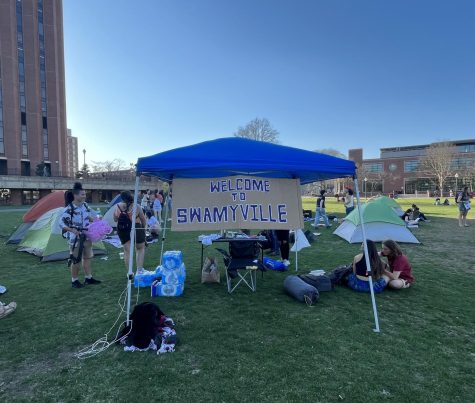All the Diggity Dogs
A course sponsored by Diggity Dogs Service Dogs started with just one canine foster. Now it’s extremely popular on campus.
Four-legged, furry service dogs walk briskly with their owners along the University of Massachusetts Amherst campus daily. But why have students suddenly noticed the growing number of these pups with a purpose on campus? The university has created a three-credit animal science course, giving students the opportunity to foster and train service dogs. Although the class is categorized under “animal science,” students of any year and major can apply for enrollment.
Diggity Dogs Service Dogs, the company that sponsors the program, proposed the idea to the university last spring. The course started with just one foster. Now, there are 12 undergraduate students, two graduate students and one postgraduate student on the UMass campus with service dogs. Smith College and Hampshire College have several student fosters as well.
Sarah Miekle, the founder and executive director of Diggity Dogs Service Dogs, realized her love for the trade when she studied psychology at Smith College.
“I knew I loved it, and furthered my education learning about it. I traveled to Florida for my certification and the rest is history,” Miekle said.
The dogs come from outside breeders in the area and start training as young as eight weeks old. They typically graduate or continue with more advanced training when they are between 14 and 18 months, then go on to help people who suffer from psychiatric illnesses. Other organizations will not provide psychiatric service dogs to anyone other then veterans.
“I just wanted to create an organization that was providing service dogs to people who were not otherwise able to get them,” said Miekle. The company also trains for medical alert dogs and mobility service dogs.
Students travel half an hour once a week to the Diggity Dogs training facility in Shelburne Falls. They meet with Miekle for training time and weekly updates. Florescent pink carpet and cream-colored walls surround the dogs and their trainers as they practice what they learned their previous week of training. At these sessions the service dogs learn to turn lights on and off, find lost keys and notify their owner if a phone or doorbell rings. Students train the young canines in generic behaviors, but once Miekle knows each dog’s specialty, they then work on advanced training for specific needs.
Trevor Brown and his 8-month-old service dog Alfie, a medium-sized, grey and white Labradoodle, met fall 2015.
“He’s always there when I need him, whether it’s to talk, cuddle — even just having him there is therapeutic,” the sustainable food and farming major said.
Brown understands the rewards of fostering a service dog, but notes that it is not an easy job.
“It’s a huge time commitment, but it’s worth it to see Alfie being trained to help people who really need him.”
Alfie accompanies Brown everywhere he goes; but sometimes, Brown said, people are not thrilled at seeing the dog.
“You can definitely tell when people are a little skeptical about him, and he can tell. But not everyone likes dogs, and that’s okay,” said Brown.
Miekle said she hopes the program will grow, but she doesn’t want to overwhelm classrooms with students and dogs. She has received 178 applicants for the upcoming semester, including non-UMass students.
“As long as we don’t have more than a couple dogs in a class, it would be great to see the program grow,” she said.
Email Julia Economou at jeconomo@umass.edu.
Note: The video for this story has been taken down per request of Diggity Dogs Service Dogs.










